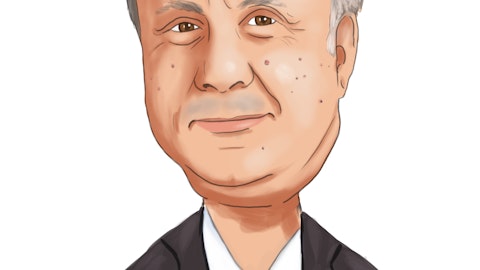Charles Christmas: I think you are spot on. When you look at the fee income categories that you mentioned, those are very important products and services that we can provide to our commercial borrowers. So as we continue to market those to existing borrowers, certainly when we bring new commercial loan relationships into the bank, we’re marketing those products and services as well. So yes, we would expect — as the commercial loan segment, especially the C&I segment continues to grow, we would expect growth in those fee income categories. Swaps are definitely a very important part of managing our balance sheet. We continue to — our basic guideline, if somebody wants a fixed rate commercial real estate loan over, say $2.5 million is they’re going to get a floating rate.
And if they want to fix it, they can do a swap. And then obviously we back out of that by simultaneously doing the opposite swap of the correspondent to — because we want the adjustable rate, obviously. On a quarter-by-quarter basis, there’ll be some lumpiness, if you will, just because of the activity that takes place in any one quarter. However, from our policy standpoint, this is a product that we will continue to have in place and we’ll continue to use — gaining income, which obviously is good, but the most important part of that product is managing the interest rate risk position of our balance sheet. And we think that that’s very important. So we would certainly expect swap fees to continue. Just want to put it out there that, that can be lumpy on a quarter-to-quarter basis, depending on the activity in any one quarter.
Erik Zwick: And last one for me, maybe for Bob or Ray, just curious about your thoughts on the UAW strikes just given the importance of auto manufacturing in the State of Michigan. And correct me if I’m wrong, I don’t think you have any direct exposure to any of the major auto manufacturers, but maybe some secondary or tertiary exposure to suppliers or even on the consumer side some employees that may be participating in the strikes and what impact that could have and how you think about the impact there?
Raymond Reitsma: This is Ray. You are correct. We don’t have any direct exposure. The tertiary and secondary impacts that you referenced are still pretty minimal on our portfolio at this point. The employee bases that have been impacted are primarily in the Southeast side of the state where we don’t have a heavy retail business. So we haven’t felt much impact there. Some of our customers that provide piece parts as opposed to tools and dyes, their volumes are starting to contract to some level. But again, it’s not terribly broad-based. So it is a situation where they can tread water, if you’ll permit the expression, for this period of time until resolution. But there hasn’t been a lot of damage to individual or corporate balance sheets to this point. Obviously, the duration of the strike and the breadth and depth of it will determine what ultimately that looks like. But it’s so far so good.
Robert Kaminski: It seems like some of the feedback that we’re getting from our clients at this point is that these platforms and these things that are being worked on from their perspective will happen. It’s just that the timing will be different than originally planned in a lot of cases. And it’ll be pushing it back a little bit. But hopefully, as we all think they get this resolved sooner than later, but we’ll see.
Operator: [Operator Instructions] Your next question comes from Damon DelMonte with KBW. Please go ahead.
Damon DelMonte: First off, congrats Bob on the retirement announcement and Ray on the promotion. Both very well deserved. So just wanted to circle back on kind of a broader margin picture question. Chuck, just given the high percentage of floating rate commercial loans, if the Fed does start to cut rates in the back half of ’24, have you guys given any thought of trying to maybe put on some hedges to protect on the downside for risk there?




